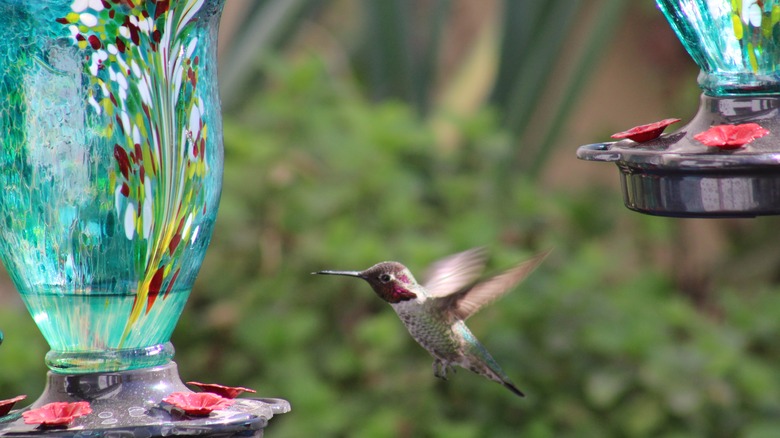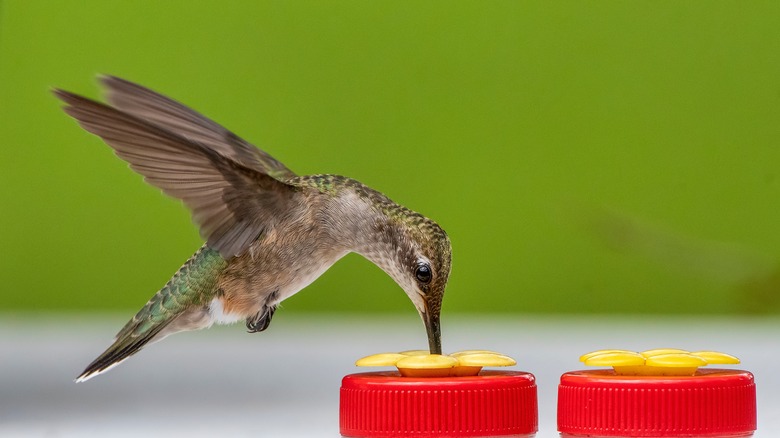TikTokers Have A Warning About Using Glass Hummingbird Feeders This Summer
Putting out nectar feeders to transform your yard into a hummingbird haven can be a rewarding experience, but you'll want to ensure your feeder is safe. In the summer, hot temperatures can cause nectar to spoil rather quickly, and mold may start to grow inside the feeder. A few TikTok creators, including @adventuresamiam and @athheennaa, have made videos warning that glass hummingbird feeders will cause the nectar to ferment even faster.
Due to the glass allowing more light and heat to be absorbed by the feeder, the nectar inside could possibly mold. This potential mold growth is why some think glass feeders make getting a drink riskier for birds and potentially dangerous; however, this claim may not be totally accurate.
While it's true that hot temperatures, specifically around or above 90 degrees Fahrenheit, will ferment the nectar and promote mold and bacteria growth, this will happen in any type of feeder. No matter what kind of hummingbird feeder you're putting out — plastic, glass, or ceramic — it's important to change hummingbird feeder nectar daily in the summer, especially if your area experiences sweltering heat.
Are glass hummingbird feeders more dangerous?
While TikTok creators inform their followers that glass hummingbird feeders are often responsible for harming your feathered friends because they may spoil quickly or grow mold, this can happen with any feeder. Additionally, glass is recommended to prevent nectar from fermenting rapidly. According to the Georgia State Department of Natural Resources, feeders with glass reservoirs have better insulation, which will help to keep them cooler than plastic feeders in the summer.
Some wildlife supply companies suggest using glass feeders rather than plastic to keep nectar at a lower temperature in hotter weather. Though several TikTok videos claim glass heats up faster because the light penetrates it, most plastic feeders are clear and would take in light and heat as well. While glass hummingbird feeders may not be as dangerous as TikToker's have been warning, it's still imperative to ensure that whatever feeder you're using is cleaned regularly and that the nectar is checked and replaced every few days or every day, depending on the conditions.
Ensuring your hummingbird feeder is safe this summer
Glass feeders and any other hummingbird feeder will become too hot rather quickly when placed in a sunny location. Relocating your feeder to an area with shade will help to keep the nectar cool for longer. Some people wrap aluminum foil around hummingbird feeders to hold off the sun's heat for a bit longer. No matter what, your nectar will eventually spoil in the summer heat. Putting out less nectar can help combat this issue, as your feathered friends will drink it faster.
If you want to keep feeding hummingbirds during scorching weather, you must be vigilant about cleaning your feeder daily and replacing the nectar when temperatures reach 90 degrees Fahrenheit or above. Otherwise, you could be putting your local birds at risk of diseases. When cleaning your hummingbird feeder, take it apart and get into every little crack and crevice. Glass feeders sometimes have unique shapes that can be more difficult to clean, but they are okay to use if you scrub them thoroughly. To disinfect feeders, soak all pieces in a solution of one part white vinegar and two parts water.

